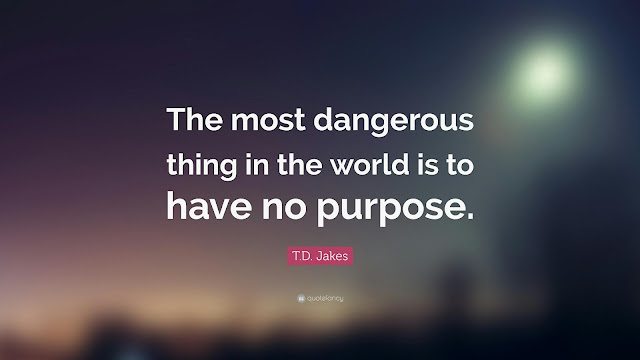A World Without Purpose (A must Read)
These questions—Who am I? Why am I here? Where did I come from? What was I born to do? What can I do? Where do I fit? Why am I different? What is my potential? Where am I going? Why did I come to this planet?—are universal questions that haunt every human being. Each of us must find the answers to these questions of purpose if we are going to enjoy a meaningful, effective, fulfilling life.
Purpose is the key to life. Without purpose, life has no meaning. There are millions today just like Mr. Cambridge. They are busy making a living, but they experience very little of life. If your goal in life is to be wealthy so you can retire, you have embarked on a depressing journey to nowhere. If your vision for life is measured by status, your upkeep will be your downfall. Vision is buried in purpose. Without knowledge of purpose, life becomes an endless string of activities with little or no significance. Like a rider on a rocking horse, life without purpose makes much motion but no progress.
A lack of purpose and the impending tragedy that results from its absence is found not only in people but in all things. When elements of nature lose their purpose, chaos and destruction are the results. When nations, societies, communities, organizations, friendships, marriages, clubs, churches, countries or tribes lose their sense of purpose and significance, then confusion, frustration, discouragement, disillusionment and corporate suicide—whether gradual or instant—reign. Purpose is the master of motivation and the mother of commitment It is the source of enthusiasm and the womb of perseverance. Purpose gives birth to hope and instills the passion to act. It is the common denominator that gives every creature an element of distinction. This guiding sense of purpose is more than an orientation toward a goal. Rather, it is a deep awareness that a common vision encompasses all life and existence. Without this vision, we can only exist. We feel no passion for living, neither do we have a reason to wake up in the morning.
Thousands of years ago, a king known as the wisest man who ever lived stated, “Meaningless! Meaningless! … Utterly meaningless! Everything is meaningless” (Ecclesiastes 1:2). This was his conclusion after years of observing man’s life, activities, plans and achievements apart from a sense of personal and corporate purpose. These words and their sad echo have returned to haunt us nearly six thousand years later. We face a world that acts like a spaceship that has lost its flight plan.
Planet earth is like a mother whose children have lost all sense of direction and all value in life. Globally speaking, everything is in motion. Mergers and acquisitions, deregulations and changing agencies of control, information technologies and international competition all alter the shape and thrust of our economies and the way we do business. Changing demographics, realigned industry structures, new strategic alliances, innovative technologies, unaccustomed modes of working and the volatility of stock markets demand a fresh approach to commerce. Increasing competition, the shrinking of the world into one large global village, the move toward freer markets in former communist countries, and the proposed reality of the European Common Market alter the way we deal with the world and it deals with us. Many industrialized nations are being transformed into Third World states as numerous people migrate from undeveloped nations.
Long-established ideologies are evaporating in the fires of revolutionary changes. Institutions long held sacred are crumbling under the weight of social pressure. In almost every nation, the situation is the same. There is political confusion, ideological frustration, social unrest, economic uncertainty, moral bankruptcy, institutionalized corruption and disillusionment with religion. All inhabit an environment of fragile diplomacy.
The world has become an incubator of stress, depression, hopelessness and fear. It seems that the kingdoms and the governments of this world are bankrupt. They no longer offer innovative solutions for these ever-increasing problems. Industrialized nations are as fragile as Third World nations. The tremendous changes in national and international situations, and the economic, political, social and cultural transitions that have accompanied these changes, now present a totally different global equation.
There is also a generation in every nation that seems to have lost its sense of purpose. They are out of touch with the values, morals and convictions that build strong families, secure communities, healthy societies and prosperous nations. Thus, the moral fabric of most societies is being stretched and tested to its outer limits. In every nation, the concern is the same. Many of the time- weathered institutions of the industrial states are being tried by challenges that threaten to transform tradition and demand creative and innovative responses.
The dynamic nature of the Third World and the developing countries, because of the infancy of their institutions and their industrial base, are even more hard- pressed to respond effectively to this changing global environment. Political, civic, economic and religious world leaders are perplexed as they see their social infrastructure cracking under the weight of these demands of the new, complex society. A strange sense of insecurity, confusion and aimlessness accompanies these modifications.
History shows that the value of life decreases and the quality of existence diminishes when a generation loses its sense of destiny and purpose. A quick glance at our current world exposes a sad picture that demands our attention. We preserve nature, for example, but kill babies. We build solid houses but cannot construct lasting homes. We are smarter but not wiser, bigger but not stronger. We know more but understand less, and we live longer but enjoy life less fully. We write more books but fail to take the time to read them. We go faster but get nowhere, conquer space but cannot conquer our habits, protect whales but abuse our children, go to the moon but wander far from home, and flirt with fantasy to avoid reality.
The United States of America, the greatest nation in recent history, has come to a crossroads because of a lack of national purpose. Warren Bonnie, distinguished professor of business administration at the University of Southern California, stated in his book On Becoming a Leader,
“America lost its edge because it lost its way. We forgot what we were here for. We talked about freedom and democracy, but we practiced license and anarchy … As a nation cannot survive without public virtue, it can’t progress without a common vision. America hasn’t had a national sense of purpose since the 1960s, when, in an unprecedented show of common cause, millions of Americans vehemently opposed government policies.”
Professor Bonnie’s words echo an ancient saying written by King Solomon: “Where there is no revelation [vision], the people cast off restraint …” (Proverbs 29:18) With the demise of communism in eastern Europe, the last source of national purpose for America has evaporated. The “red” threat of the bear and the cold war no longer provide the common cause for national commitment that every nation needs.
King Solomon’s words contain principles that every living thing should heed. Where there is no purpose, there is no self-control, no moral conviction and no ethical boundaries. This principle is increasingly evident in both our personal and corporate lives. America spends more money annually on drugs than on oil. The “Land of the Free and the Home of the Brave” has become the world’s number one addict.
Professor Bonnie further contends that “the moment we decided we could create our own reality, we had no use for dreams, forgetting that a dreamless sleep is death.” The famous television producer/writer Norman Lear, when commenting on the disillusionment in America said, “The societal disease of our time is short-term thinking.” In essence, we have lost our long-term vision and our sense of destiny. Where there is no purpose, no internal reason for living, no significance in life, the demand for discipline, commitment, self-control and respect for authority will gradually diminish until we, like Mr. Cambridge, will sit among our life-long accomplishments and cry with regret, “Is this all there is?”
In more than twenty-five years of working with people in businesses, universities, governments, churches, schools, marriages and families, I have met countless individuals who have achieved an incredible degree of success but have found themselves struggling with an inner hunger that revealed a deep need for personal fulfillment and a yearning for individual significance. This feeling of emptiness and internal failure even after a significant measure of material and social success is a direct result of the failure to discover purpose in life and a reason for being born. Until this direction is discovered, life remains an experiment that is based on assumptions and hypotheses.
You must realize that your fulfillment in life is dependent on your becoming and doing what you were born to be and do. Anything less makes life your enemy and death your friend. It is essential, vital, crucial and necessary that you understand this fundamental principle of purpose and pursue it with all your heart. For without purpose, life has no heart. Remember, those who don’t know where they are going will probably end up someplace else.
Therefore I do not run like a man running aimlessly; I do not fight like a man beating the air.
1 Corinthians 9:26




Comments